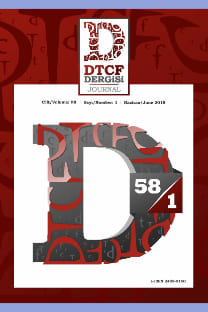A JOURNEY TO ANCIENT SUMER: THE RECONSTRUCTION OF THE PAST IN JENNIFER J. GARRITY'S HISTORICAL CHILDREN'S NOVEL SECRET OF THE SCRIBE
This paper argues that Jennifer J. Garrity's historical children's novel Secret of the Scribe (2008) with its fictional stereotyping of Ancient Sumer and its polytheistic religion undercuts the possibility of the novel to critically engage its child readers with Sumerian history and culture. By selecting a young female slave as the historical personage of her novel and endowing her with contemporary qualities in tandem with individualism and the ethos of the marketplace, Garrity draws a very modern individual atypical of her time. While, the reader, on one hand, looks back critically on Sumerians' developed sense of collectivist religion, interpreting it as a threat to self-determination and personal autonomy, on the other hand, s/he appreciates the Sumerians for being the first ancient civilization that bears the imprints of a capitalist market society. The use of history enters the text, in so far as it creates a safe zone for fashioning, perpetuating and justifying the norms and values of the present and reassuring the future.
ANTİK SÜMER'E YOLCULUK: JENNIFER J. GARRITY'NİN TARİHİ ÇOCUK ROMANI “SECRET OF THE SCRIBE”DE GEÇMİŞİN YENİDEN İNŞASI
Bu makale, Jennifer J. Garrity'nin Secret of The Scribe (2008) isimli çocuk romanının, Antik Sümer uygarlığını ve çok tanrılı Sümer dinini kurgusal düzlemde klişileştirerek, çocuk okurların Sümer tarihi ve kültürüne eleştirel bir bakış geliştirebilme ihtimalini yok ettiğini ileri sürmektedir. Garrity'nin, romanın tarihi ana karakteri olarak köle bir genç kadın seçmesi ve ona bireycilik ve piyasa etiği gibi çağdaş nitelikler vermesi, ait olduğu zamana uymayan, oldukça modern bir birey portresi çizmektedir. Okur, bir yandan Sümerlerin gelişmiş kolektif din anlayışına eleştirel gözle bakıp bunu kendi kaderini tayin etme ve kişisel özerkliğine bir tehdit olarak algılarken, diğer yandan Sümerleri kapitalist pazar toplumunun izlerini taşıyan ilk uygarlık olması nedeniyle takdir eder. Bu şekilde, tarih kullanımı, günümüze ait norm ve değerlerin düzenlenip sürdürülmesi ve meşrulaştırılması ve bu sayede de geleceğin teminat altına alınmasını açısından güvenli bir alan yaratılabildiği müddetçe metne dahil olur.
___
Barthes, Roland. “The Discourse of History.” The Rustle of Language. Roland Barthes. Trans. Richard Howard. Berkeley, CA; U of California P, 1984. 127140.Baxendale, John and Christopher Pawling. Narrating the Thirties: A Decade in the Making, 1930 to the Present. New York: Macmillan, 1996.
Black, Jeremy and Anthony Green. Gods, Demons and Symbols in Ancient Mesopotamia; An Illustrated Dictionary. London: British Museum Press, 1992.
Brooks, Van Wyck. “On Creating a Usable Past.” The Dial 64 (1918): 337-341. Rpt in Critics of Culture: Literature and Society in the Early Twentieth Century. Ed. Alan Trachtenberg. New York: Wiley, 1976. 165-171.
Carnes, Mark. Introduction. Novel History: Historians and Novelists Confront America’s Past. Ed. Mark Carnes. New York: New Simon and Schuster, 2001. 13-18.
Collingwood, Roger George. “The Historical Imagination.” The Idea of History; with Lectures 1926-1928. R.G.Collingwood. Ed. Jan Van Der Dussen. Rev. ed. Oxford: Oxford UP, 1994. 231-249.
Cooper, Pamela J., Rives Collins and Maurice Saxby. The Power of Story. South Melbourne: Macmillan Education Australia, 1994.
Fleishman, Avrom. The English Historical Novel: Walter Scott to Virginia Woolf. Baltimore, MD: Johns Hopkins UP, 1971.
Garrity, Jennifer Johnson. Secret of the Scribe. Camino, CA: Brimwood, 2008.
Hutcheon, Linda. “Postmodernism.” The Routledge Companion to Critical Theory. Eds. Simon Malpas and Paul Wake. London: Routledge, 2006. 115-126.
Lehmann, Chris. Revolt in the Masscult. Chicago: Prickly Paradigm, 2003.
Kramer, Samuel Noah. The Sumerians: Their History, Culture and Character. Chicago: U of Chicago P, 1963.
Mink, Louis. “Narrative Form as a Cognitive Instrument.” The History and Narrative Reader. Ed. Geoffrey Roberts. London: Routledge, 2001. 211-220.
Murdoch, Iris. The Sovereignty of Good. 2nd ed. London: Routledge, 2001.
Stephens, John. Language and Ideology in Children’s Fiction. London: Longman, 1992.
Sutcliff, Rosemary. “History is People.” Children and Literature: Views and Reviews. Ed. Virginia Haviland. Glenview,IL: Scott, Foresman, 1973. 305-312. Internet Archive. Web. 18 Oct. 2017.
Thaler, Danielle. “Fiction Versus History: History’s Ghosts.” The Presence of the Past in Children’s Literature. Ed. Ann Lawson Lucas. Westport, CT: Praeger, 2003. 3-12.
Tönnies, Ferdinand. Tönnies: Community and Civil Society; Cambridge Texts in the History of Political Thought. Trans. and ed. Jose Harris. Cambridge: Routledge, 2001.
White, Hayden. “Historical Text as Literary Artifact.” The History and Narrative Reader. Ed. Geoffrey Roberts. London: Routledge, 2001. 221-236.
Wood, Gordon S. “The Purpose of the Past: Reflections on the Uses of History.” Historically Speaking 10:1(2009): 2-6. Project Muse. Web. 13 Dec. 2017.
- ISSN: 0378-2905
- Yayın Aralığı: Yılda 2 Sayı
- Başlangıç: 1942
- Yayıncı: Ankara Üniversitesi Dil ve Tarih-Coğrafya Fakültesi
Sayıdaki Diğer Makaleler
ANADOLU'DA ÖZGÜN BİR EKONOMİK AKTÖR TİPİ: 1HOMO KAYSERİCUS
Azime PEKŞEN YAKAR, Dilek DEMİRTEPE SAYGILI
TARTIŞMA METİNLERİNDE DİLBİLGİSEL BAĞLAŞIKLIK KULLANIMI
ÇANAKKALE İLİNDE PALEOLİTİK DÖNEM İNSAN İZLERİ
İSMAİL ÖZER, MEHMET SAĞIR, İSMAİL BAYKARA, BERKAY DİNÇER, BAŞAK KOCA ÖZER, SERKAN ŞAHİN, ECE EREN, AYŞEGÜL ÖZDEMİR
HERKES VE ORTALAMA HERGÜNKÜLÜK: VIRGINIA WOOLF'UN “DALGALAR” ROMANINA HEİDEGGERCİ BİR YAKLAŞIM
PLATON FELSEFESİNDE KÖTÜLÜK PROBLEMİ
SERGEY DOVLATOV'UN ESERLERİNDE RETORİK FİGÜRLER
DİL VE MİTOSUN DÜNYASI: KÜLTÜRÜN ARKEOLOJİSİNE İLİŞKİN BİR İNCELEME
